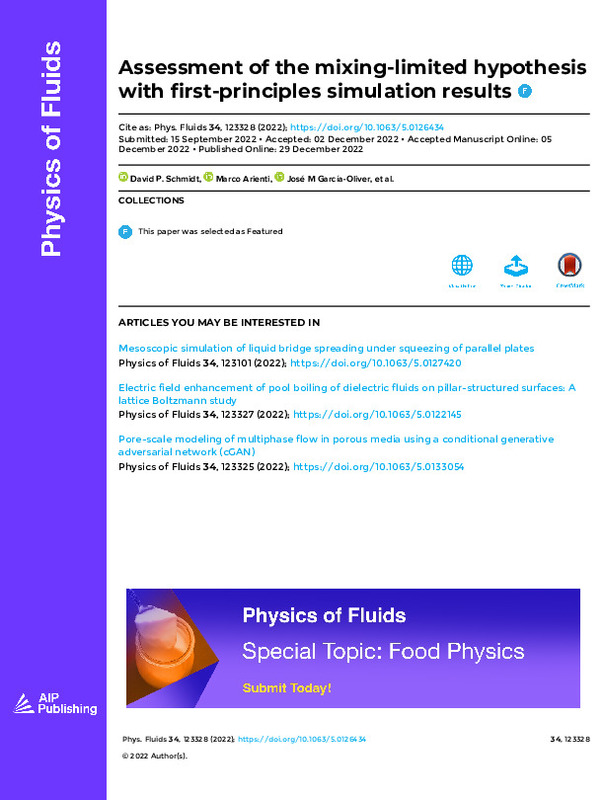JavaScript is disabled for your browser. Some features of this site may not work without it.
Buscar en RiuNet
Listar
Mi cuenta
Estadísticas
Ayuda RiuNet
Admin. UPV
Assessment of the mixing-limited hypothesis with first-principles simulation results
Mostrar el registro sencillo del ítem
Ficheros en el ítem
| dc.contributor.author | Schmidt, David P.
|
es_ES |
| dc.contributor.author | Arienti, Marco
|
es_ES |
| dc.contributor.author | García-Oliver, José M
|
es_ES |
| dc.contributor.author | Pastor Enguídanos, José Manuel
|
es_ES |
| dc.date.accessioned | 2023-07-28T18:02:48Z | |
| dc.date.available | 2023-07-28T18:02:48Z | |
| dc.date.issued | 2022-12 | es_ES |
| dc.identifier.issn | 1070-6631 | es_ES |
| dc.identifier.uri | http://hdl.handle.net/10251/195702 | |
| dc.description.abstract | [EN] Starting with two well-tested, one-dimensional models of non-evaporating, mixing-limited sprays, governing equations for liquid mass and two-phase momentum for each model can be manipulated to reveal the formal similarity between momentum and liquid volume fraction. The consequence of this similarity is that momentum, when properly non-dimensionalized, is equal to the liquid volume fraction at any time and at any axial location within a non-evaporating, mixing-limited spray with a constant rate of injection. An alternative, the more well- known similarity between mass fraction and velocity, is also mathematically evident. We compare predictions of this mathematical analysis to high-fidelity, first-principles simulation results of a non-evaporating spray to assess the validity of the theoretical similarity. The analysis of the simulation not only confirms the mathematical derivations but also points to subtlety in the definition of the spray velocity. In particu- lar, the density-weighted velocity is required to observe similarity. The requirement of density-weighted velocity means that similarity tests require knowledge of both phase velocities. The agreement also works to confirm that the first-principles simulations are indeed mixing- limited, despite the finite nature of domain size and resolution. | es_ES |
| dc.description.sponsorship | ACKNOWLEDGMENTS This study was supported by a grant from Sandia National Laboratories, a multi-mission laboratory managed and operated by National Technology and Engineering Solutions for Sandia LLC, a wholly owned subsidiary of Honeywell International, Inc., for the U.S. Department of Energy's National Nuclear Security Administration under Contract No. DE-NA0003525. | es_ES |
| dc.language | Inglés | es_ES |
| dc.publisher | American Institute of Physics | es_ES |
| dc.relation.ispartof | Physics of Fluids | es_ES |
| dc.rights | Reserva de todos los derechos | es_ES |
| dc.subject.classification | MAQUINAS Y MOTORES TERMICOS | es_ES |
| dc.title | Assessment of the mixing-limited hypothesis with first-principles simulation results | es_ES |
| dc.type | Artículo | es_ES |
| dc.identifier.doi | 10.1063/5.0126434 | es_ES |
| dc.relation.projectID | info:eu-repo/grantAgreement/DOE//DE-NA0003525/ | es_ES |
| dc.rights.accessRights | Abierto | es_ES |
| dc.contributor.affiliation | Universitat Politècnica de València. Escuela Técnica Superior de Ingeniería del Diseño - Escola Tècnica Superior d'Enginyeria del Disseny | es_ES |
| dc.contributor.affiliation | Universitat Politècnica de València. Instituto Universitario CMT-Motores Térmicos - Institut Universitari CMT-Motors Tèrmics | es_ES |
| dc.description.bibliographicCitation | Schmidt, DP.; Arienti, M.; García-Oliver, JM.; Pastor Enguídanos, JM. (2022). Assessment of the mixing-limited hypothesis with first-principles simulation results. Physics of Fluids. 34(12):123328-1-123328-12. https://doi.org/10.1063/5.0126434 | es_ES |
| dc.description.accrualMethod | S | es_ES |
| dc.relation.publisherversion | https://doi.org/10.1063/5.0126434 | es_ES |
| dc.description.upvformatpinicio | 123328-1 | es_ES |
| dc.description.upvformatpfin | 123328-12 | es_ES |
| dc.type.version | info:eu-repo/semantics/publishedVersion | es_ES |
| dc.description.volume | 34 | es_ES |
| dc.description.issue | 12 | es_ES |
| dc.relation.pasarela | S\486622 | es_ES |
| dc.contributor.funder | U.S. Department of Energy | es_ES |








